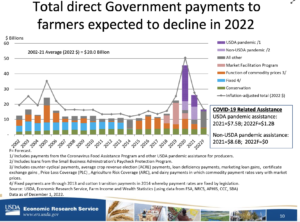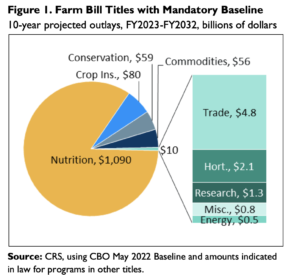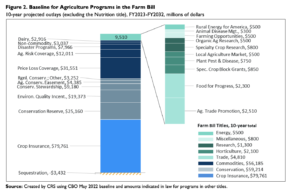The House Agriculture Committee unveiled a draft farm bill Friday that would revamp a key international food aid program, boost risk management options for specialty crop growers and nullify California's…
Rep. Thompson Elected House Ag Committee Chair, 2023 Farm Bill Debate on the Horizon
DTN Ag Policy Editor Chris Clayton reported last week that, “Rep. Glenn ‘GT’ Thompson of Pennsylvania got the call Wednesday afternoon from a Republican steering committee that he would officially chair the House Agriculture Committee in the next Congress.”
Congratulations, @CongressmanGT! Looking forward to working with you to pass the critically important Farm Bill next session. https://t.co/KMG3TfTMJL
— Sen. Debbie Stabenow (@SenStabenow) December 8, 2022
Clayton explained that, “Just elected to his eighth term in Congress, Thompson has served as ranking member on the Agriculture Committee for the past two years. During that time, he visited more than 30 states talking and listening to others about challenges and needs in agriculture and rural America. He now will lead the committee with the GOP holding a slim majority and a chance to shape the next farm bill.”
The DTN article noted that, “Thompson said his first listening session as chairman will likely come the first weekend in January during the Pennsylvania Farm Show.
“‘We need to hear those voices from throughout rural America and make sure that we’re putting together a farm bill that really does a great job of basically restoring a robust rural economy, serving those hardworking families that provide us with food and fiber,’ Thompson said. ‘So, I’m looking forward to the honor and to the challenge.'”
Chairman's Chat: @CongressmanGT on A Strong Future for American Agriculture https://t.co/DTKdXMIX8W
— FarmPolicy (@FarmPolicy) December 11, 2022
Clayton pointed out that, “Thompson said the committee isn’t in a position to make decisions on commodity prices at the moment, but he would like to find a way for farmers to avoid repeated ad-hoc disaster bills. ‘We really haven’t had a robust discussion,’ he said. ‘You know, I’ve traveled around, but this needs to be a discussion that the entire committee — the Republicans and Democrats — are engaged in with the agriculture community.’
“Ad-hoc disaster aid for farmers this year is projected at about $11.9 billion, down from $19 billion in 2021. Pandemic aid passed by Congress in 2020 topped $23.5 billion, according to USDA. All that spending was outside of traditional farm programs.

“Thompson said he would like to find a way that crop insurance supports farmers with those losses rather than relying on Congress to pass new aid programs. That would establish more reliability for both farmers and agricultural lenders, he said.”
Based on member input, @ILFarmBureau has outlined #FarmBill priorities and shared these with legislative leaders. We believe the next farm bill must continue to be WTO-compliant, provide price and revenue protection for farmers, and link nutrition and commodity programs. #IFBAM22 pic.twitter.com/KczQ0UDoDC
— Richard Guebert (@ILFBPres) December 4, 2022
Larry Lee reported last week at Brownfield that, “Thompson tells Brownfield he plans to audit agriculture programs to find unspent dollars, educate colleagues and the administration about how farmers positively impact climate and the economy, and he’ll try to get the farm bill done on time.”
Monroe Co. farmer Daryl Cates of Waterloo has become President of the American Soybean Association, the latest in a long line of IL farmers leading that organization. He'll be leading the charge to put ASA's priorities into the 2023 Farm Bill. @ASA_Soybeans @ILSoybean pic.twitter.com/pUTYvZJcfD
— Stu Ellis (@FarmGateMedia) December 10, 2022
Meanwhile, Chuck Abbott reported last week at Successful Farming Online that, “Climate mitigation is expected to be a leading issue when Congress updates farm policy in the new year. It is the only area assured of additional funding in the farm bill due in 2023. The climate, health, and tax law enacted in August appropriated $20 billion for USDA conservation programs with a priority on climate action.”
And Prairie Farmer writer Joshua Baethge reported last week that, “[Chuck Conner, National Council of Farmer Cooperatives President and CEO] identified four areas that will drive the farm bill debate: climate-related issues, the needs of urban versus rural areas, costs and nutrition. He notes that the four chairs and ranking members of the House and Senate Agriculture Committees are experienced members that should be agreeable to working with producers. They include Thompson and ranking Democrat Rep. David Scott, D-Ga., along with Senators Debbie Stabenow, D-Mich., and John Boozman, R-Ark.”

“According to [Conner], it remains to be seen whether this bill will go down as a ‘revolutionary’ overhaul or something less ambitious. One of the biggest issues the next congress will need to overcome is how farm bill money is allocated.

“In 2018, 76% of farm bill funding went toward the supplemental nutrition program. That number is projected to hit 84% in 2023. Only 6% of funding will be allocated to crop insurance, with 5% going toward commodities and 4% to conservation.”





